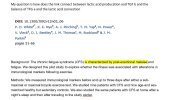Made a brief summary of the results here (EDIT: added full text and Bluesky link)
Link to Bluesky:
1) The DecodeME study compared DNA of ca. 15,000 ME/CFS patients and 250,000 controls and found significant differences in 8 regions of our genome. The Manhattan plot below shows the genes and chromosomes involved.
Let’s unpack the results
2) A first major finding is that the results for females and males were very similar. This was quite a surprise, as some had expected the biological pathways behind ME/CFS to differ between males and females. Not so!
3) ME/CFS is much more common in women (84% of ME/CFS participants were female), but the millions of DNA variants analyzed didn’t provide an answer of why this is the case.
The sex chromosomes weren’t analyzed yet, so this is likely where the answer for the sex difference lies.
4) A second major finding: the genetic information could be used to estimate the heritability of ME/CFS: how much the illness is due to genetic differences in common DNA variants. The result was modest: 9.5%. This aligns with a previous estimate (8%) from the UK biobank.
5) Let’s now move on to the key results.
Big genetic studies apply a strict significance threshold of 5*10^-8 (less than one in a million) to avoid differences between patients and controls being due to chance. In DecodeME there were 8 findings or hits above this threshold.
6) Six hits showed up in the main analysis (GWAS1), while another was found using only the ME/CFS patients who reported an infectious onset. The last one came up in GWAS2 which used a different subset of controls.
7) So, what are the 8 results? Table 3 in the paper shows the main results: the location on the genome, the DNA letters that were different, how common these variants are and if the variant was increased or decreased in ME/CFS.
8) The effect sizes are quite small (odds ratios below 1.1), but this is expected for genetic studies like this (it’s the same in other diseases).
To get a feel of how subtle this is, we recalculated the prevalence in ME/CFS and controls, which only differ by 1-2% (see screenshot below).
9) The 8 hits or DNA variants occur in 13%-60% of the general population. So it’s not that these determine if you have ME/CFS or not. Instead, they should be seen as clues or pointers to what's really going wrong.
10) The 8 hits point to a specific region on our genome but a lot of DNA fragments (SNPs) are inherited together in what’s called linkage disequilibrium (LD). So, we’re not entirely sure which gene in the region is causally related to ME/CFS.
11) The first region (chr1q25.1) for example is associated with 11 genes. Luckily there are databases with info about how SNPs affect the expression of nearby genes. This lets the researchers zoom in on the most likely suspects.
12) Now it gets interesting because these suspect genes were often linked to the immune and nervous systems.
RABGAP1L for example promotes expulsion of the bacterium Streptococcus pyogenes and limits replication of multiple viruses.
13) Another gene, Olfactomedin-4 (OLFM4), suppresses antibacterial and inflammatory responses by binding to neutrophil proteins and neutralizing their ability to kill.
14) A third gene CA10 is involved in synaptic transmission and has previously been found in people experiencing chronic pain. It might explain why pain is such a common symptom in ME/CFS.
15) The HLA-region also got a significant result (HLA-DQA1*05:01). This region is important in differentiating your own body's cells from invaders like viruses or bacteria.
Many autoimmune diseases have abnormalities in the HLA region.
16) A caveat is that these genes have other functions as well. Future research will need to figure out which ones are relevant to ME/CFS. We suspect that a lot of scientists will use these leads to start new research and get closer to the pathology of ME/CFS.
17) DecodeME delivered, but we also have to highlight what is perhaps the main limitation of the DecodeME results: the authors tried to replicate their results in different cohorts, and this did not go very well.
18) A likely explanation was differences in case definitions. The other databases often did not select patients using modern case definitions that require the key symptom of post-exertional malaise (PEM).
19) One possible exception is the Dutch Lifelines cohort, where cases were clinically diagnosed with ME/CFS and had PEM (although there are some doubts if the study did so reliably). Here, some associations were repeated but did not reach full significance.
20) DecodeME also did not diagnose ME/CFS using clinical examinations (which would not be possible for such a large sample size). It required a self-reported diagnosis and checked this with questionnaires based on the IOM and CCC criteria.
21) Lastly, these were the initial findings from DecodeME, which only looked at common DNA variants (where the least common version still occurs in more than 1% of the population).
22) The researchers hope to look at rare genetic variants in a follow-up study called SequenceME. This will get an even more detailed picture of the DNA differences associated with ME/CFS.
Rare variants might also have bigger effect sizes. More info about this follow-up here
https://www.actionforme.org.uk/sequenceme-first-of-a.../
23) There’s much more to say about this study, but we’ll wrap it up here and save the rest for an in-depth blog post on our website. A warmhearted thanks to the researchers and patients who made this landmark study possible!


